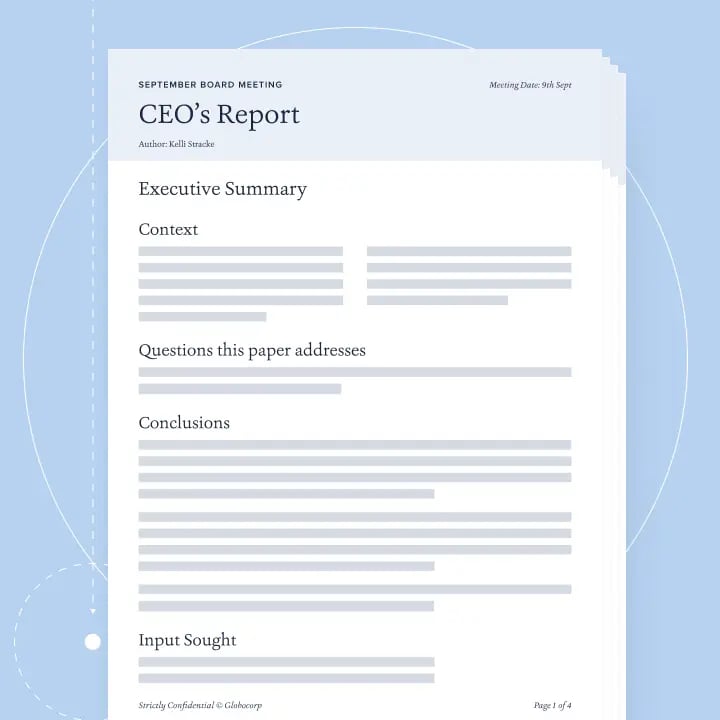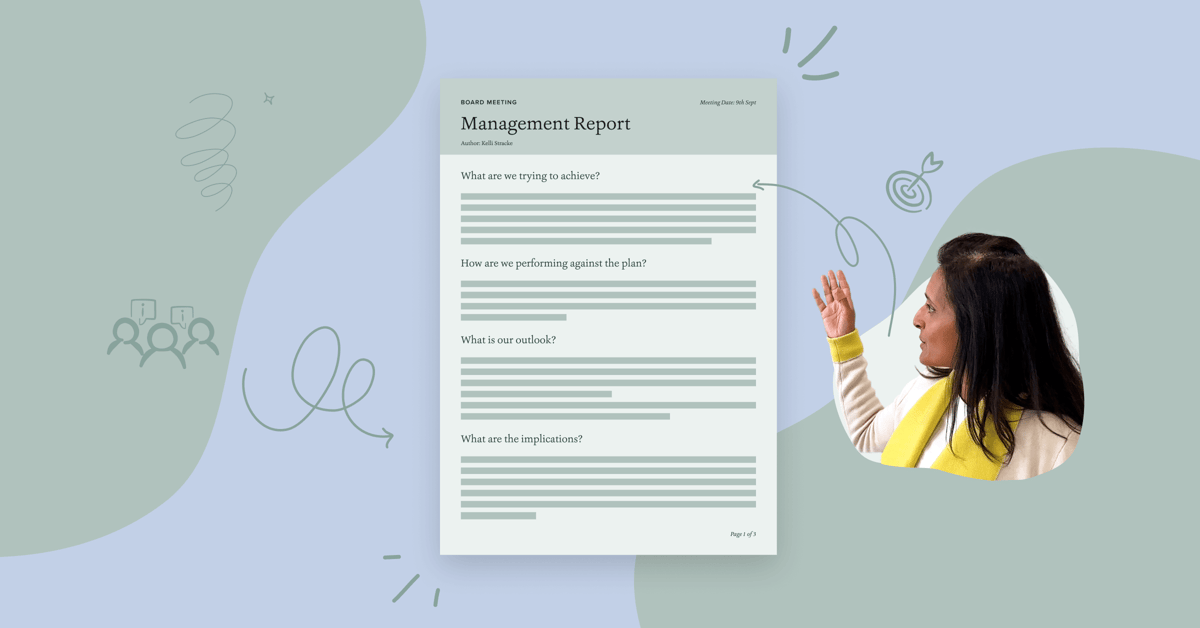In summary
- An effective management report answers the board’s core questions with clarity, context, and sound judgment.
- Use a four-part report structure: purpose, performance vs. plan, outlook, and implications.
- Put the key messages up front, write in plain English, and support with a simple KPI view.
- Cut “busyness” updates. Be honest about risks and what you need from the board.
Useful tips:
- Executive summary: Kick off with a punchy summary to orient time-poor readers and highlight your key messages.
- Clarity and readability: Use concise, engaging language and visuals like dashboards to make your insights accessible.
Too often, reports become ignorable paperwork rather than practical tools for strategy. Leaders want confidence that you grasp critical issues and know how to navigate them.
What are management reports, and why do they matter?
Management reports give the board a clear view of the organization's performance and direction. They are not just updates; they are decision-making tools. Done well, they deliver insight and earn trust by showing that you understand performance drivers and can be trusted with decisions and resources.
A strong report connects the dots between activity, outcomes, and strategy. Directors want to know whether you grasp the key issues in your role and have the smarts to propose how best to tackle them. Your ability to identify what matters most is a sign of strong leadership.
What are the key features of an excellent management report?
The best reports share a few consistent features:
- They are structured around the key questions the board needs answered.
- They focus on the material issues, not operational details.
- They explain not just what is happening, but also why it matters.
- They combine narrative with data to support judgment.
- They are concise and written in plain English, highlighting the necessary implications and decisions.
In short: a great management report is clear, focused, forward-looking, and actionable.
What should you include in a management report?
Board effectiveness research by Board Intelligence shows that nearly half of directors believe reports are not transparent about bad news, and 68% rate board packs as weak or poor. To avoid this pitfall, great reports should focus on four core questions that drive insight and decisiveness.
1. What are we trying to achieve?
Start with clarity of purpose. Remind the board of your goals and priorities already set, and how they align with the wider organization. Without this context, performance data won't mean anything to a board.
2. How are we performing against our plan?
Provide an honest view of performance. Use a simple KPI dashboard to show progress against agreed metrics, and flag where the business is ahead or behind. Address bad news openly and add a “so what?” section detailing what it implies and how you’re responding. Directors' confidence in you is strengthened when you tackle the tough questions, own the message, and talk about what you’re doing to address what went wrong.
3. What is our outlook?
Give a forward-looking view. What does the data suggest about the coming months or years? Highlight the risks, opportunities, and scenarios that could affect delivery. Inviting the reader’s ideas, advice, or experience here can make your report more compelling and collaborative
4. What are the implications?
When you take a step back and consider all of the information you've shared, what is your confidence in the plan? Spell out what this means for decisions, resources, or priorities. Be explicit about what you need from the board: approval, challenge, or support. Your perspective matters; balanced judgment builds confidence and earns respect.
What else should you consider when writing management reports?
- Include a concise executive summary. Overly long reports dilute attention and hide what matters.
- Use plain English. Avoid jargon, acronyms, and technical language where possible; poor communication can unravel your hard work.
- Put key messages first. Details can follow in the appendices.
- Balance narrative with data. One won't work without the other. Use a data dashboard to provide a visual summary of the key performance indicators you are reporting against.
- Be honest about uncertainty. Boards value candor over false optimism.
What are the benefits of writing a great management report?
When written well, management reports enable better conversations and greater impact in the boardroom. They deepen understanding of performance, spark creativity through forward thinking, and make meetings more productive with concise pre-reads. They offer some key benefits:
- Build trust between executives and the board through transparency.
- Save time by reducing unnecessary detail and duplication.
- Support accountability by clearly linking actions, outcomes, and strategy.
- Show how taking the time to think critically about performance deepens everyone's understanding of what's going on and why.
The real benefit is not the report itself but the quality of discussion and decision it enables.
Final takeaway
Management reports are more than a compliance exercise. When written with clarity and purpose, they focus the board’s attention on what matters, enable faster and better decisions, and strengthen accountability. If your current reports feel long, unfocused, or reactive, start with the four core questions. They will sharpen the conversation and improve the impact of every meeting.
If you'd like to find out how to support your team to write high-quality management reports every time, speak to our advisory team about our board reporting services or take a look at Lucia, our AI-powered thinking and writing platform for board and management reporting.

A thinking and writing platform that helps you to write brilliantly clever and beautiful reports that surface breakthrough insights and spur your business to action.
Find out moreFAQs
-
What is the difference between management and board reports?
Management reports focus on organizational performance and outlook, while board reports cover a broader range of information for governance, including papers on strategy, risk, and compliance.
-
How often should management reports be written?
Most organizations produce them monthly or quarterly. The frequency should reflect the pace of change in your business and the board’s needs.
-
What common mistakes should be avoided in management reports?
- Overloading the board with detail.
- Providing data without context.
- Avoiding difficult issues or risks.
- Failing to show a clear link between activity and strategy.
-
How can I make my management report more engaging?
- Start with the key messages and questions for the board.
- Use clear visuals for data.
- Keep the narrative short and focused.
- Write as if you are answering the board’s questions directly.
-
What tools can help with creating effective management reports?
Software such as Board Intelligence’s reporting tools can help structure reports, provide KPI dashboards, and keep information transparent and accessible. Templates and collaborative platforms can also save time and improve consistency.
Can't find what you're looking for? Our friendly team are on hand to help.
Talk to our team



